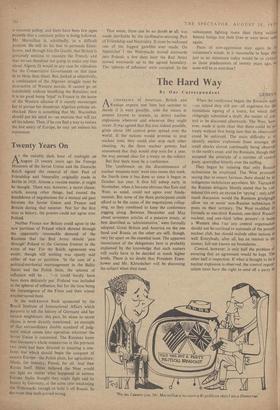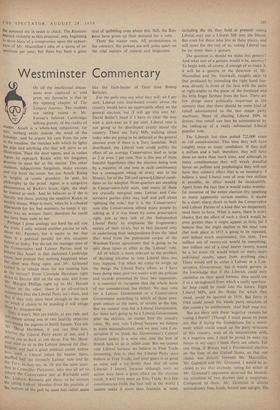The Hard Way
By Our Correspondent
G EN EV ACONFERENCE of American, British and Russian experts met here last summer to decide if it were possible. with the means at present known to science, to detect nuclear explosions wherever and whenever they might occur. It was agreed that this was indeed possible, given about 180 control posts spread over the world. If the' nations would promise to stop nuclear tests, they could also stop each other cheating. As the three nuclear powers had announced that they would stop tests for a year, the way seemed clear for a treaty on the subject.
But first there must be a conference.
The 'conference on the discontinuance of nuclear weapons tests' went into recess this week, the fourth time it has done so since it began in October last year. It first fell asleep early in November, when it became obvious that East and West, as usual, could not agree over funda- mentals. But none of the three participants could afford to be the cause of the negotiations collap- sing, so they combined to keep the conference jogging along. Between December and May about seventeen articles of a putative treaty, at best described as 'administrative,' were formally adopted. Great Britain and America on the one hand and Russia on the other are still, though, very far apart on the essential issue. The apparent insouciance of the delegations here is probably explained by the knowledge that such matters will really have to be decided at much higher levels. There is no doubt that President Eisen- hower and Mr. Khrushchev will be discussing the subject when they meet.
When the conference began, the Russians %%eic —as indeed they still are—all eagerness for the immediate signing of a treaty, for which tho obligingly submitted a draft; the matter of con- trol to be discussed afterwards. The West, ho‘k' ever, made it quite clear that there could be n" treaty without first being sure that its observance could be enforced. The main difficulty is !" identify nuclear explosions from amongst the small shocks almost continually being observed in the earth's crust: and the Russians, though the accepted the principle of a number of control post, quarrelled bitterly over the stalling.
They began by insisting that only Russian technicians be employed. The West protested• saying that to ensure fairness, there. should be 0" indigenous technicians anywhere. Mr. Tsarapkin, the Russian delegate, bluntly stated that he con sidered this only an excuse for 'spying' : only after much discussion would the Russians grudgingly allow 'six or seven' non-Russian technicians in posts on their territory. The West modified it formula to one-third Russian, one-third Western' nuclear, and one-third 'other powers'--it being a Western idea elm any control organisatio0 should not be confined to nationals of the present nuclear club, but should include other nations as well. Everybody, after all, has an interest in the matter; fall-out knows no boundaries.
Control, however, is only half the problem of ensuring that an agreement would be kept. The other half is inspection. If what is thought to be nuclear explosion is observed, the control organ!' sation must have the right to send off a party Io 'No, no, 1 assure you, Mr. Macmillan is no more a Republican than 1 ant a Den ocrui: the assumed site in order to check. The Russians reacted violently to this proposal, only beginning to show hints of a compromise upon the appear- ance of Mr. Macmillan's idea of a quota of in- spections per year; but there has been a great deal of quibbling even about this. Still, the Rus- sians have given up their demand for a veto.
There the matter rests. All protestations to the contrary, the powers are still poles apart on the vital matters of control and inspection.















































 Previous page
Previous page